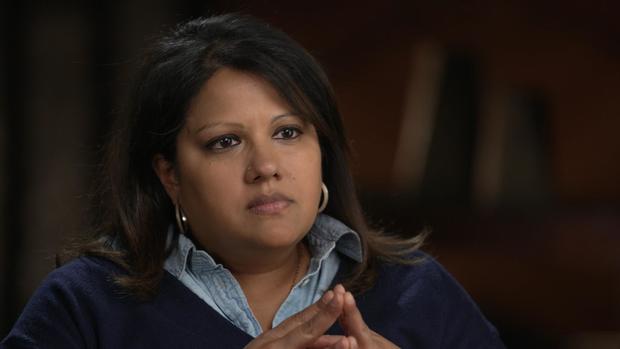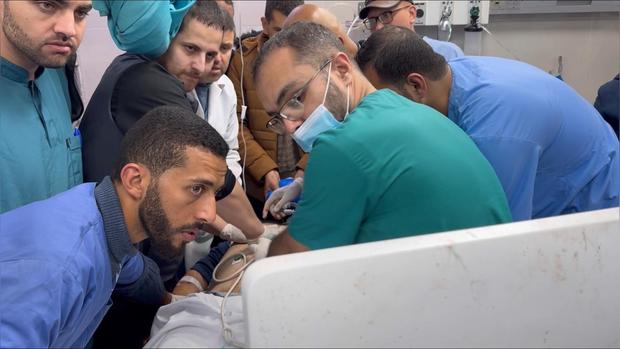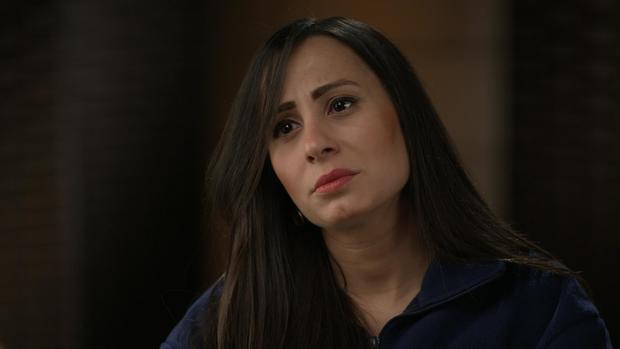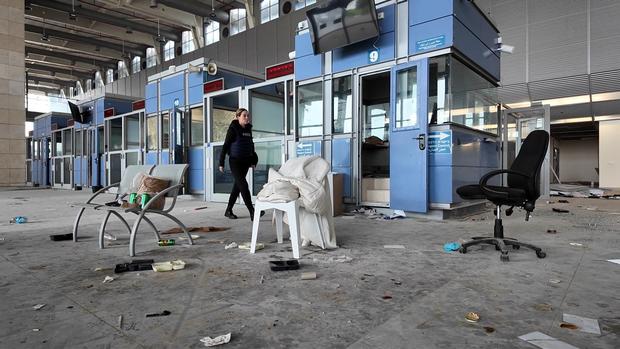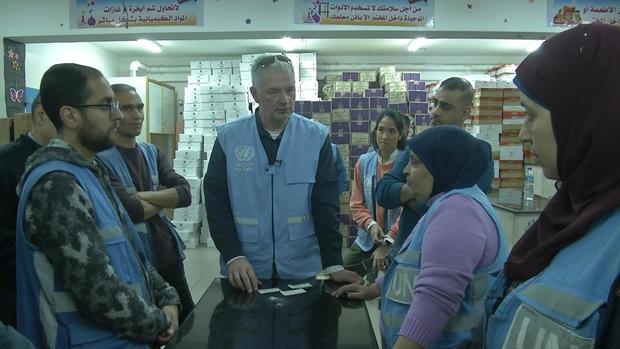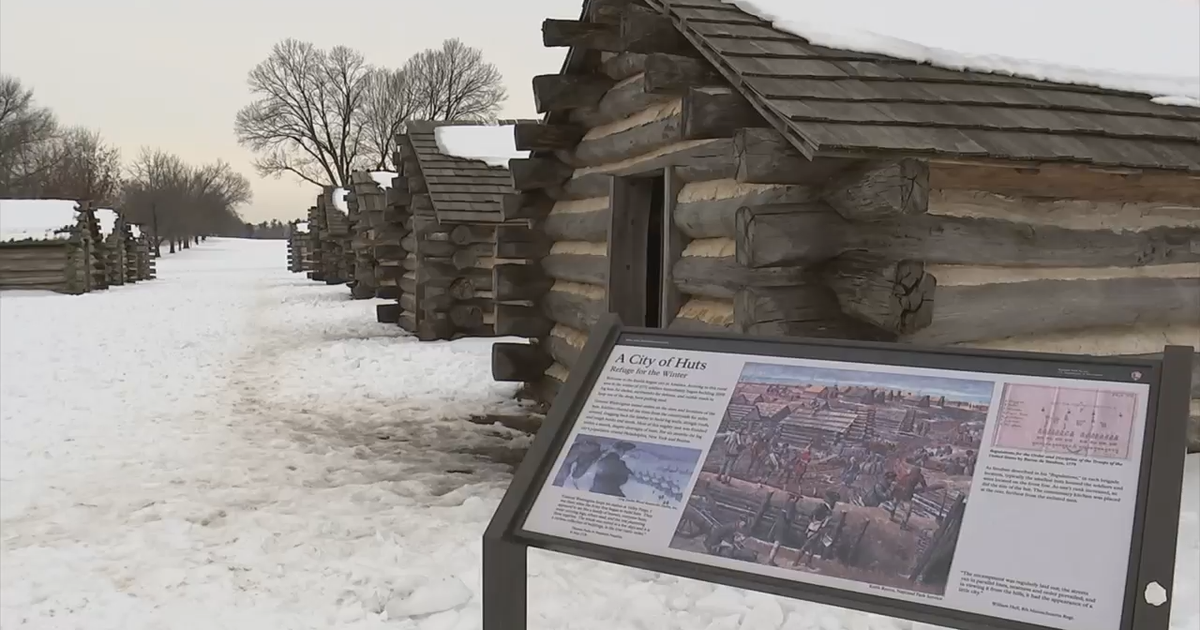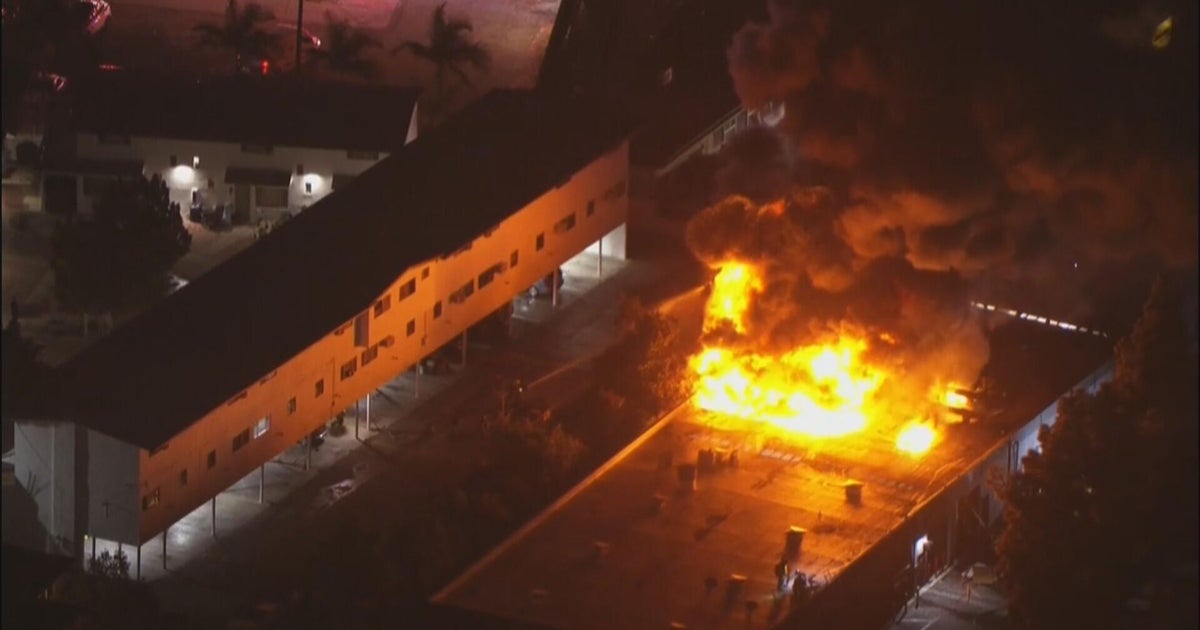American doctor describes "incomparable" devastation in Gaza impacting children as Israel-Hamas war continues
When the terrorist group Hamas unleashed its barbaric attack inside Israel last October, the response by the Israeli government was swift.
Israel launched thousands of troops, tanks and more than 45,000 bombs into Gaza, decimating entire cities.
The Hamas-run Gaza Ministry of Health says more than 29,000 people have been killed and nearly 2 million displaced - numbers many in the Israeli press and the United Nations are reporting.
Israel has barred journalists from independently accessing the Gaza strip, defying the long-standing precedent of allowing reporters into war zones.
Aid workers say a "catastrophic" humanitarian crisis is unfolding in Gaza, but reporting on it has been challenging.
So we asked aid workers, including two Americans – to share their view from inside Gaza over the last 142 days.
A warning -- it is difficult to watch.
This was the scene at Nasser Hospital in southern Gaza in late January.
For weeks, the hospital had been surrounded by fighting. But another battle played out inside its crowded corridors
Doctors and nurses, short on supplies and beds, knelt on the floor as they tried to save bombing victims.
Deeper in the hospital, we saw Dr. Nahreen Ahmed – a critical care specialist from Pennsylvania.
Our CBS producer, based in Gaza, shot this video as Dr. Ahmed checked on the young victims of an air strike she treated the night before. This 13-year-old boy did not survive.
The Gaza Ministry of Health estimates 12,000 children have died here since the war began.
We met Dr. Ahmed days after she left Gaza, exhausted after working a two week stretch at Nasser.
Dr. Nahreen Ahmed: We have mass casualties coming in in waves at [the] hospital. That's happening at least three or four times a night.
Sharyn Alfonsi: In one night?
Dr. Nahreen Ahmed: Mhmm
Dr. Nahreen Ahmed: So, you know, a regular day for me was seeing children with shrapnel injuries I have never in my life seen before, with traumatic brain injury. Death happening in a fully treatable situation because the supplies are not available.
Dr. Ahmed is the daughter of Bangladeshi immigrants. She grew up in Philadelphia and works at a hospital there. She is also the medical director of MedGlobal - a U.S.-based NGO that trains local health care workers in disaster and conflict zones.
39 years old, she's worked in a half dozen war zones, including six trips to Ukraine in the last two years.
She told us supply and medicine shortages have deepened the suffering in Gaza.
Dr. Nahreen Ahmed: It's basic medications. It's pain medication. There're people getting limbs amputated without any anesthesia. That's what we're seeing on a day to day basis. And I can tell you that things that we have put into the pipeline to get to Gaza can often take weeks to months.
Sharyn Alfonsi: Weeks to months?
Dr. Nahreen Ahmed: Uh-huh.
Sharyn Alfonsi: And you need them yesterday.
Dr. Nahreen Ahmed: Yeah.
Sharyn Alfonsi: How does what you're seeing in Gaza compare to what you've seen in these other war zones and conflicts?
Dr. Nahreen Ahmed: It is-- incomparable, I would say. I don't think I've seen this many-- children affected in any of the other war zones I've ever been to. I don't think I've seen this many people squeezed in a small area without any ability to leave. I don't think I've been this close to the sound of missile strikes-- with the house shaking, where the hospital is shaking while I'm trying to operate in the ICU.
Sharyn Alfonsi: So how do you function and operate when you can hear gunfire and explosions at your doorstep?
Dr. Nahreen Ahmed: We go into, like, medical mission mode. So bombs going off or not-- we are absolutely focused on what's in front of us. Is it terrifying? Yes, of course. Do we think about it after the fact? Absolutely. You know, there are hospitals that are under siege. This happened with Shifa Hospital. It happened with Nasser Hospital, al Amal Hospital, just to name a few.
The U.N reports more than 300 health care workers have been killed since the war began.
In late January, Dr. Ahmed and four of her colleagues evacuated Nasser.
Ten days ago, Israeli troops stormed the hospital, claiming Hamas was hiding inside. Patients, staff and thousands sheltering in the hospital spilled onto the street.
Sharyn Alfonsi: You know that the IDF has accused Hamas of hiding and operating in these hospitals. Did you see that at all?
Dr. Nahreen Ahmed: I can really just talk about, what I know. And what I know is that the health care catastrophe in these hospitals, that's what I saw.
Even as explosions surrounded the hospital last week, teams from the World Health Organization made their way in....negotiating through the dark to evacuate 32 critical patients – some of them children.
Aid workers say there are still patients and staff inside the hospital with no running water or electricity.
Nebal Farsakh: The international humanitarian law is clear: health care workers, humanitarians, ambulances and hospitals should be respected and protected in all situations. But, unfortunately this is not the case in Gaza
Nebal Farsakh is the spokesperson for the Palestinian Red Crescent, it's part of the international Red Cross.
We met her in this call center in Ramallah in the Israeli-occupied West Bank.
Here, operators dispatch emergency workers in Gaza, 50 miles away.
Layan Hamada (on recording): Hello?
Operator (on recording: Hello dear.
This is a recording of one of the calls the Red Crescent responded to the week we were there.
On January 29th, the Israeli military ordered parts of Gaza City to evacuate. So, 15-year-old Layan Hamada and her family piled into their car to try and get to safety.
'They are shooting at us,' she tells the operator.
Sharyn Alfonsi translating recording of Layan Hamada: 'The tank is next to me'
Sharyn Alfonsi translating recording of operator: 'Are you hiding?'
Sharyn Alfonsi translating recording of Layan Hamada: 'Yes, in the car. We are next to the tank.'
Then…
The line goes dead.
When the operator called back, a child answers — 6-year-old Hind Rajab. The girl's cousin.
"The tank is next to me,' she says.
Sharyn Alfonsi translating recording of Hind Rajab: 'I'm so scared, please come. Please call someone to come and take me.'
The Red Crescent says this is the ambulance they sent. It was discovered along with the bodies of two medics, 12 days after they were dispatched – when Israeli Defense Forces left the area.
Hind Rajab was also killed. The six year old's body was found inside this car alongside five members of her family.
The IDF told us that the 'incident is still under review' but has accused Hamas, in the past, of using ambulances to transport its fighters.
Nebal Farsakh: The story of Hind, it's not the only story. It's absolutely dozens of calls we're getting since the beginning of the war in Gaza, where we feel helpless. Because we are completely denied access to many areas in Gaza, to only provide our emergency medical services.
Sharyn Alfonsi: So what you're describing is these people can't leave, it's not safe for them to leave, and you can't get to them.
Nebal Farsakh: Exactly.
This is what Hind Rajab and her family were trying to escape. We obtained this video from a U.S. worker who was with one of the first teams allowed into northern Gaza.
Across this apocalyptic landscape, images show two-thirds of Gaza has been flattened.
Satellite images reveal how densely populated the 25-mile strip was before the war.
Today, most of the nearly 2 million residents displaced from their homes have evacuated to the south.
Here, 40 or more people pack into a room at a makeshift shelter. Hundreds share one bathroom.
Those who can't find space in the shelter settle in the sprawling sand pits of Gaza's tent city in Rafah on the border with Egypt.
For Gazans there is no way out.
Sharyn Alfonsi: We're at the Erez border crossing. If you were traveling between Gaza and Israel you would've come through this terminal. On October 7th Hamas stormed the terminal, you can see the damage all around us. Obviously the terminal has been closed since then so now there is only one border crossing from Israel into Gaza and that's for humanitarian aid.
That crossing is known as Kerem Shalom. The IDF would not allow us to film there.
Before the war, more than 500 trucks carrying goods came through the crossing every day.
Today, on average about 85 trucks of aid get through.
Scott Anderson is trying to get any aid that does come in, distributed.
Anderson is an Army vet, from Iowa who did two tours in Afghanistan.
"60 Minutes" first met him in Gaza in 2014, when he served as the deputy director of operations for the U.N Relief and Works Agency, known as UNRWA.
After the war began in October, Anderson, who'd retired, returned to the job.
Sharyn Alfonsi: As you know, as an American journalist, we can't get in there. What is it that you see? What is it like every day?
Scott Anderson: What you mostly see from people everyday is they're tryin' to find food-- tryin' to stay warm, and tryin' to find somewhere to use the bathroom. I mean, that's what people's lives consist of. It's very much a pressure cooker environment. You can feel it in the air. It's tense.
There is no commercial food available in Gaza and the U.N. says 70% of people don't have access to clean water. So, nearly 2 million Gazans are dependent on aid for all [of] their food and water.
Last week, UNICEF reported that one in six children under the age of two in northern Gaza is 'severely malnourished.'
Scott Anderson: Everybody's reliant on the international community, the international humanitarian community, to provide their basic necessities. You know, in an ideal world there'd be 600 trucks a day coming into Gaza.
Sharyn Alfonsi: You're nowhere close to that number.
Scott Anderson: We're nowhere close to that number.
Sharyn Alfonsi: What's the problem? Is the holdup in the inspection?
Scott Anderson: You have two governments and the U.N. and a lotta people involved. There are the security inspections of the-- of the goods, which I understand.
Sharyn Alfonsi: The Israelis have said the problem's on the U.N. side
Scott Anderson: I would say that is entirely not true. It's not just the U.N. Every day there's a couple hours where nothin' moves, okay? And that's not us. There's just nothing to get.
For 70 years UNRWA has been the largest aid organization in Gaza providing food, education and medical care.
But to its critics, including some Israelis, the agency is corrupt.
Last month, Israel accused 12 of UNRWA's 13,000 employees of helping to plan and carry out the October 7th attacks.
The U.N. fired those employees, but 16 countries including the U.S., have stopped funding the organization while investigations are ongoing.
Scott Anderson: I mean I was shocked that somebody associated with the U.N. could do that. but unfortunately throughout history many individuals have betrayed organizations that they work for, betrayed the values. We do uphold UN values, humanitarian principles, and we are responding to the best of our ability in Gaza right now.
Sharyn Alfonsi: If UNRWA collapses, who would do the work that-
Scott Anderson: Nobody--
Sharyn Alfonsi: --you're doing?
Scott Anderson: There's nobody that can do the work we do. UNRWA is the backbone of the operation, and without us the operation will collapse.
On Thursday, Israeli Prime Minister Benjamin Netanyahu said he wants to completely shut down UNRWA.
For the first time, Netanyahu outlined his plan for Gaza after the war, which included allowing the Israeli military to operate in Gaza indefinitely.
The IDF has begun an internal review of its shortcomings before and during the October 7th attacks.
Amid ongoing negotiations, a member of Israel's war cabinet announced that if the 134 hostages are not home in two weeks, Israel will launch a ground offensive in Rafah, where more than a million and a half people are sheltering.
The U.S. urged Israel to refrain, warning it could worsen an already catastrophic situation.
Produced by Ashley Velie. Associate producer, Jennifer Dozor. Broadcast associate, Erin DuCharme. Edited by Michael Mongulla.

